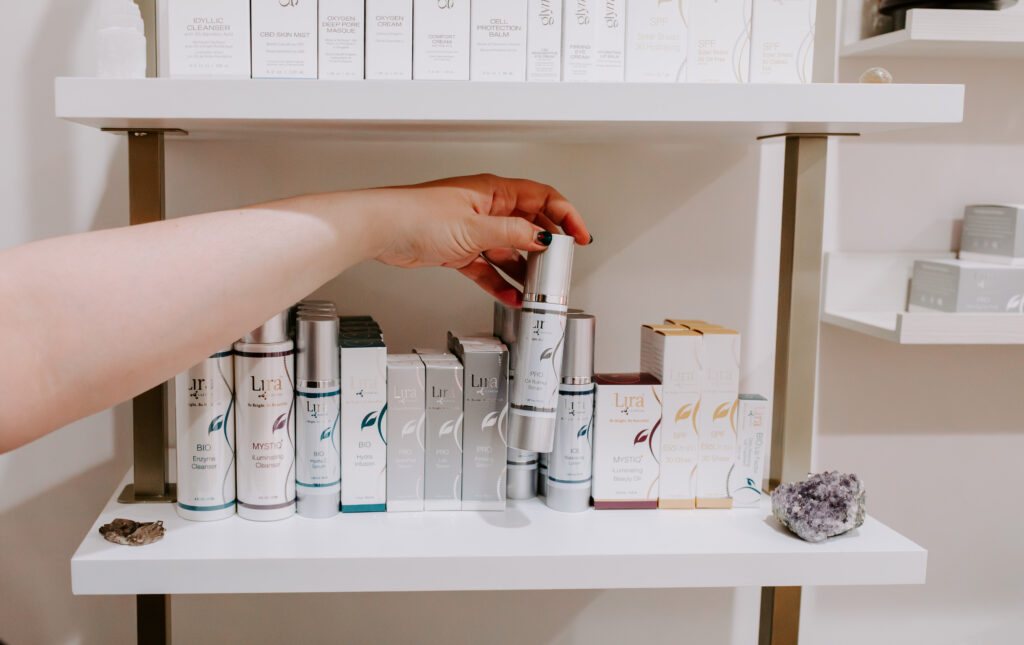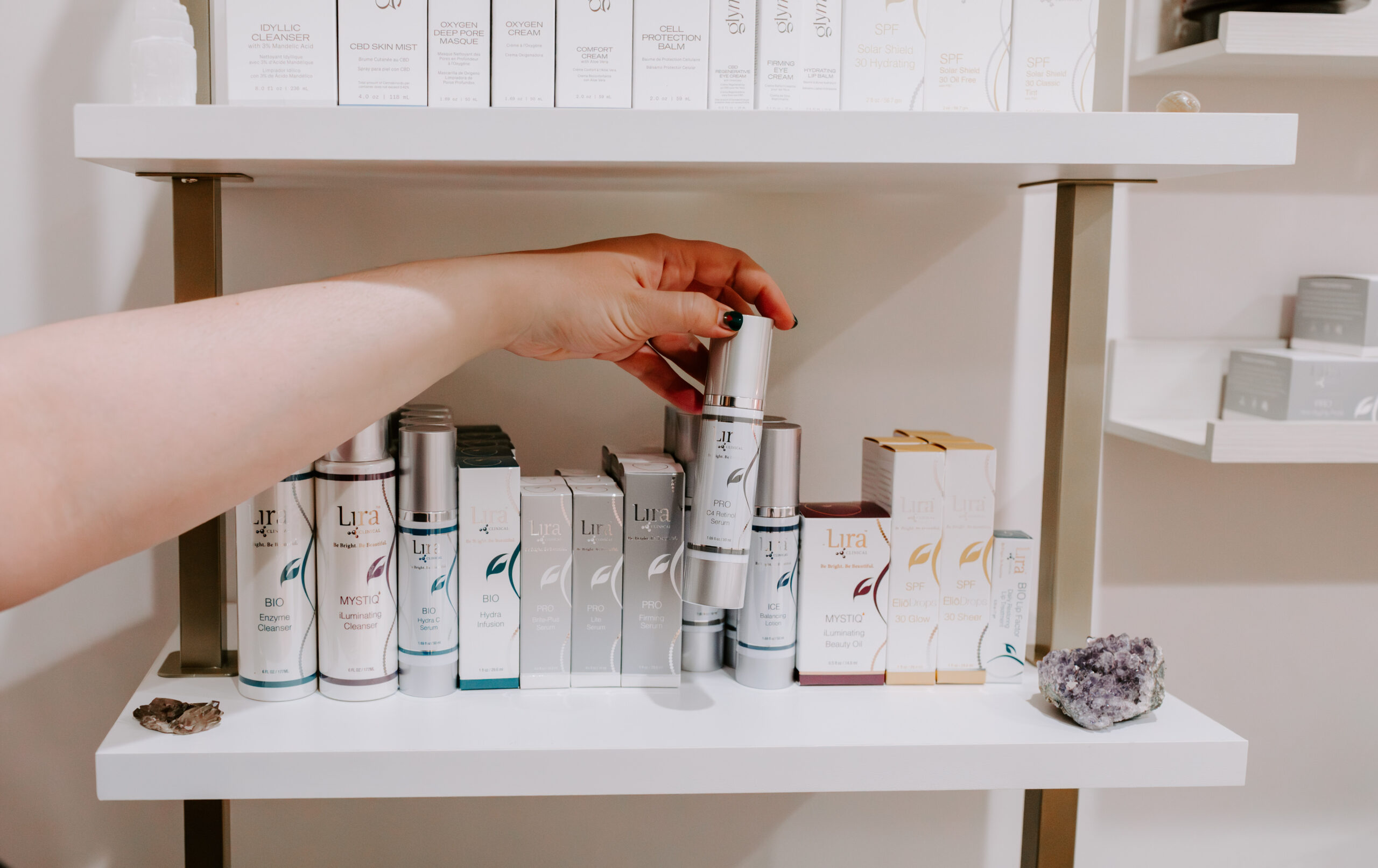Retinoids have quite the reputation in the skincare industry. They’re commonly considered one of the three Holy Grail products in addition to Vitamin C and SPF. These three products help your skin to age gracefully while fighting off environmental damage. The main goal with retinoids is to allow your skin to function at a higher level while addressing multiple concerns. Most commonly we see these products referred to as retinol, but this is just one type of retinoid.
What are retinoids?
Retinoid is the general name for retinol and other derivatives of Vitamin A. Vitamin A is an essential nutrient, not only for your body, but also for your skin’s health. Our skin needs vitamins and minerals just like our bodies do in order to function properly. Incorporating Vitamin A allows your skin to function better and improve the overall structure of your skin. There are four main types of retinoids, which we will discuss further down.
What do retinoids do?
Think of retinoids as superheroes for the skin. They have so many benefits and truly benefit the health of your skin. They help improve the structure and function of your skin. Retinoids smooth fine lines, wrinkles, and texture. They improve clarity, brightness, and luminosity. Vitamin A products can also help with improving the foundation of your skin. How do they do all of this? Retinoids increase cellular turnover in the skin. This means that it speeds up the process in which new cells come up to the surface of the skin. This not only helps to improve the texture of your skin, but it stimulates the production of high quality collagen and elastin.
Collagen and elastin are structural elements of your skin that give it shape, bounce, and firmness. When these essential components begin to break down, you’ll begin seeing signs of aging like fine lines, wrinkles, laxity, drooping, and thinness in your skin. While retinoids are great for aging skin, they are also beneficial for smoothing out texture, improving clarity and tone, treating sun damage, and improving acne and hyperpigmentation. Vitamin A is an antioxidant so these products will also provide antioxidant support and protection.
Types of Retinoids
The four types of retinoids are retinyl esters, retinol, retinaldehyde, and retinoic acid. Retinoids must be converted to retinoic acide in the skin so that our skin can use it effectively. The more conversions needed, the weaker the retinoid. This is not necessarily a bad thing, though. Weaker strength retinoids are still effective and are tolerated better than stronger formulas.
Retinyl esters are the weakest type of retinoids because because they need to convert 3 times in your skin to become retinoic acid. Retinol is what we see in a lot of over the counter products and needs to convert twice. Retinaldehyde is a stronger retinoid that needs one conversion in your skin. Finally, we have retinoic acid. This is the strongest retinoid and typically is available through prescription. Retinoids have been known to cause side effects, especially stronger retinoids like those found in prescriptions. These side effects include irritation, redness, sensitivity, and flaking. It’s very important to talk to your esthetician about how and when to use your retinoid.
Retinoids are a great step to add in to your routine, but I can’t stress enough how important it is to be using one that is well formulated for your skin. Your esthetician can guide you in the process of introducing retinol into your skin. Retinoids are safe for all skin types, colors, and most conditions. I typically recommend adding one into your routine at any point between the time you’re 25-35 to help keep your skin aging in a healthy manner.

What to look for
When choosing a retinoid, there are a few things to consider. First, consider your budget. A good retinoid is an investment and it’s worth it to pay the extra cost. Professional brands are formulated with high quality ingredients from reputable sources. They are more concentrated so you use less for more benefit. Second, look at the packaging. When it comes to antioxidants, I always look for an opaque bottle and I prefer an airless pump bottle. Antioxidants can become unstable when exposed to light and oxygen and will begin to break down. Retinoids will not be as effective once they begin to oxidize, so make sure the product you choose has solid packaging to protect the formula. Third, take a look at what other ingredients are in the formula. Do they help with the goals you’re working towards? Will they provide extra soothing properties to help buffer the side effects? This sounds like a broken record, but professional grade products are generally formulated with other ingredients to give you better results with less irritation and steps in your routine, so I will always recommend them over products you can purchase at Sephora or Target.
My Recommendations
Lira Clinical PRO C4 Retinol Serum: honestly this is my favorite, it’s such a beautiful formulation, feels nice on the skin, contains Vitamin C for extra antioxidant protection, and is gentle enough for sensitive skin types to use as it has minimal side effects.
Glymed Retinol Rejuvenation Serum: this serum delivers 5% concentration in a micro encapsulated formula meaning that it releases slower into the skin to help deter negative side effects.
Hale and Hush Rare Retinal Serum: this is going to be the best option for sensitive skin. It contains soothing ingredients and botanical extracts to condition the skin while the retinaldehyde does its job.
Face Reality Retinal B3 Serum: this retinoid is a great option for acne prone skin because it also has anti-inflammatory properties and can help reduce the redness associated with acne lesions.
If you’re interested in learning more about these products and choosing the correct one for you, come on in for a consultation or book a virtual consultation! We can go over all of your skin concerns and set you up with a routine that will work for you. You can book your appointments here. If you’d like to learn more about the Holy Grail of youthful skin, you can check out my blog posts about SPF and Vitamin C here.

Be The First To Comment